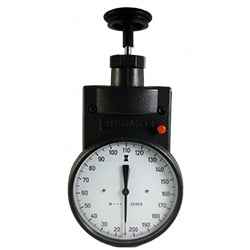How a Tachometer Assists Monitor Engine Wellness and Performance
How a Tachometer Assists Monitor Engine Wellness and Performance
Blog Article
Checking Out the Features and Advantages of a Tachometer: A Comprehensive Overview for Car Lovers
From providing real-time data on engine rate to helping in optimizing gear changes, the tachometer offers as even more than simply a dial on the control panel. Its multifaceted features not just enhance driving experience yet additionally play an essential role in maintaining engine health and wellness and efficiency.
Recognizing the Basics of a Tachometer
In the realm of vehicle instrumentation, understanding the fundamentals of a tachometer is necessary for any type of auto lover aiming to explore the ins and outs of engine performance surveillance. A tachometer, frequently displayed on the dashboard of a car, gauges the engine's revolutions per min (RPM) This vital instrument supplies real-time data on just how fast the engine crankshaft is turning. By keeping an eye on the RPM, chauffeurs can ensure they are running within the ideal variety to make best use of efficiency and effectiveness.
Tachometers usually have actually a scale noted in revolutions per min, with a redline showing the maximum rate at which the engine can safely run (tachometer). This info is important for avoiding engine damages and optimizing equipment changing for hands-on transmissions. Furthermore, tachometers can help in detecting engine issues such as misfires or a falling short ignition system by spotting uneven RPM analyses
Relevance of Keeping An Eye On Engine Speed

Monitoring engine speed is a crucial aspect of car upkeep and performance optimization for vehicle enthusiasts and specialists alike. The engine rate, gauged in transformations per min (RPM), indicates just how quickly the engine's crankshaft is turning. By keeping a close eye on the RPM, vehicle drivers can make certain that the engine is operating within the optimum variety, preventing potential damage from over-revving or stalling. Checking engine rate is specifically crucial throughout equipment changes, as it aids motorists figure out the correct time to alter gears for smooth velocity and efficient gas usage.
In addition, tracking engine rate can also supply important insights right into the total health of the vehicle. Unusual changes in RPM might indicate problems such as a clogged air filter, fuel system problems, or perhaps engine misfires. By identifying these problems beforehand with the tachometer readings, vehicle drivers can attend to prospective issues promptly, avoiding extra severe damage and expensive repair services down the line. Generally, keeping track of engine speed with a tachometer is a basic practice that can boost driving performance, prolong engine life, and ensure a more secure and extra enjoyable driving experience.
Enhancing Performance Via Gear Shifts
Proper equipment shifting guarantees that the engine operates within its optimum power band, enabling for smooth acceleration and enhanced fuel economic situation. When changing equipments, it is vital to pay attention to the engine rate showed on the tachometer.

To achieve peak efficiency with equipment shifts, motorists ought to practice smooth and timely shifts between gears, matching engine speed with roadway speed to harness the complete capacity of their lorry's powertrain.
Maximizing Efficiency With a Tachometer
Grasping the art of equipment changing in high-performance lorries not only boosts driving experience yet likewise plays a critical duty in taking full advantage of performance with a tachometer. tachometer. By paying close focus to the tachometer analyses, vehicle drivers can maximize their equipment changes to run within the engine's most reliable array. When accelerating, changing equipments at the ideal RPM shown by the tachometer can stop the engine from exhausting or underperforming, leading to enhanced fuel efficiency and overall performance
Furthermore, a tachometer aids drivers prevent unnecessary revving, which not only loses gas but also puts unnecessary pressure on the engine. Consistently keeping track of the tachometer while driving permits smoother equipment transitions, reducing damage on the transmission system in time.

Advanced Tips for Tachometer Utilization
To dive into advanced suggestions for tachometer application, consider including the usage of shift lights. Change lights are aesthetic indications that light up when it's time to shift gears based on engine revolutions per minute (RPM), allowing for seamless gear changes without frequently keeping track of the tachometer. By fine-tuning change factors and establishing cautioning limits, vehicle drivers can optimize acceleration and engine efficiency click here to find out more while minimizing the threat of over-revving.
Verdict
In verdict, the tachometer functions as an important device for cars and truck enthusiasts to monitor engine speed, boost efficiency through equipment changes, and make best use of effectiveness. By understanding the functions and benefits of a tachometer, motorists can enhance their driving experience and lengthen the life expectancy of their car. Making use of sophisticated suggestions for tachometer application can better boost driving skills and overall efficiency on the road.
Report this page